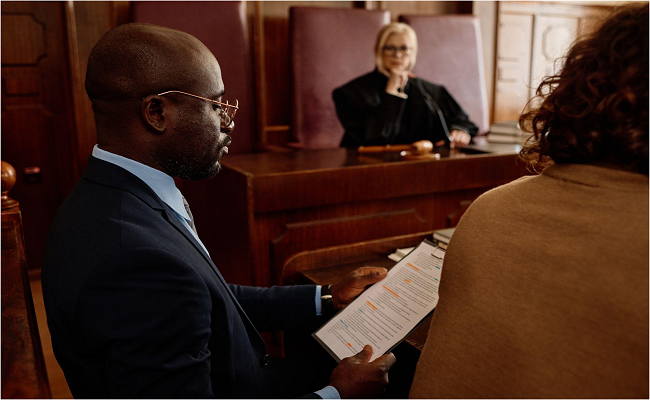Choosing to become a criminal defense lawyer is a respected and important decision, as it involves defending individuals charged with crimes and defending their legal rights. In the following comprehensive guide, we'll be taking a detailed look at the educational requirements, key abilities, and practical experiences needed to become a successful criminal defense lawyer.
Exploring the Responsibilities of a Criminal Defense Lawyer
The duties of a criminal defense attorney are varied and complex, demanding a strong devotion to justice and a steadfast dedication to upholding the constitutional rights of those charged with crimes. Beyond the popular media portrayals, these legal professionals serve a crucial function in ensuring a fair and balanced legal system.
Dispelling common misconceptions about the field is the first step in understanding the demanding yet rewarding nature of a career in criminal defense law. To understand more about what criminal defense lawyers do, you can check out the website of a criminal defense law firm and see what their areas of expertise are. Here's an example: elitecriminaldefense.com.
Educational Requirements
The journey to becoming a criminal defense lawyer starts with obtaining a quality education. Aspiring criminal defense lawyers typically start with a bachelor's degree in a related field. While there are no specific majors required, a degree in criminal justice, political science, or pre-law studies can provide a solid groundwork for future legal studies.
Law school admission requirements vary, but a strong undergraduate GPA, impressive LSAT (Law School Admission Test) scores, and compelling letters of recommendation are generally essential. It's crucial to research law schools carefully, considering factors like faculty reputation, internship opportunities, and overall program quality.
Law School Journey
Law school is the crucible where the theoretical foundations of the legal system are transformed into practical skills. Aspiring criminal defense lawyers should tailor their curriculum to include courses that provide a deep understanding of criminal law, constitutional law, and evidence. These subjects form the bedrock of knowledge necessary for navigating the intricacies of criminal defense cases.
Seeking out internships with criminal defense attorneys during law school provides a hands-on understanding of the daily challenges faced by legal professionals in this field. Whether it's drafting legal documents, interviewing clients, or observing court proceedings, these experiences offer practical insights that supplement academic learning.
Moreover, don't underestimate the power of networking during your law school journey. Professors, legal professionals, and fellow students can become valuable connections. Attend networking events, engage in legal discussions, and seek out mentorship opportunities. Building relationships during law school can open doors to internships, job opportunities, and long-term professional connections.
Building Legal Skills
Strong legal skills are the cornerstone of any successful lawyer, and criminal defense attorneys are no exception. Developing impeccable research and writing skills is crucial, as is the ability to argue persuasively in court.
Engaging in activities like mock trials and moot court competitions can hone these skills and build confidence in a courtroom setting. Networking with professors and legal professionals during this time can also open doors to valuable mentorship and future opportunities.
Passing the Bar Exam
One of the most significant hurdles to becoming a criminal defense lawyer is passing the bar exam. This thorough exam assesses a candidate's comprehension of legal concepts and their capacity to put them into practice.
Effective study strategies, access to reputable review courses, and dedication are key components in successfully navigating this critical milestone. Passing the bar exam is a significant accomplishment, providing the gateway to practicing law and embarking on a career in criminal defense.
Establishing a Career Path
With a law degree in hand and the bar exam behind you, the next steps involve making critical decisions about your career path. Criminal defense lawyers have options, including private practice and public defense.
Private practice offers autonomy and the potential for higher earnings, but building a client base and managing the business side of law practice are additional challenges. On the other hand, public defense provides an opportunity to serve the community and work on a diverse range of cases, often with a steadier salary.
Joining criminal defense organizations and associations is a strategic move at this stage. These organizations provide valuable networking opportunities, resources, and a means to stay informed on the newest developments in criminal law.
Continuing Education and Professional Development
The legal landscape is dynamic, with laws and precedents constantly evolving. Ongoing education is essential for keeping up-to-date with these modifications. Participate in continuing legal education (CLE) programs, attend conferences, and engage in workshops to deepen your knowledge and refine your skills. Specializing in criminal defense can further enhance your expertise and credibility within the legal community.
Professional development extends beyond legal knowledge. Building a robust professional network by attending events, joining bar associations, and cultivating relationships with fellow lawyers is essential. Networking not only opens doors to potential clients but also provides a support system and mentorship opportunities.
Ethical Considerations in Criminal Defense
Criminal defense lawyers often grapple with challenging ethical dilemmas. Balancing zealous advocacy for clients with ethical responsibilities is a delicate art. Upholding the principles of justice while ensuring a fair and unbiased legal process is paramount.
Integrity, honesty, and a commitment to the rule of law are the cornerstones of ethical practice. Navigating issues such as client confidentiality and conflicts of interest and maintaining professional boundaries requires a strong ethical compass. Staying true to these principles not only preserves the integrity of the legal profession but also builds trust with clients and peers.
Wrapping Up
Becoming a criminal defense lawyer is a journey that combines rigorous education, practical experience, and ongoing professional development. From the early days of law school to navigating the complexities of ethical considerations in criminal defense, the path requires dedication, resilience, and a passion for justice.
As you begin this gratifying profession, recall that each step is an occasion to acquire knowledge and evolve. Embrace challenges, seek mentorship, and stay committed to upholding the values that define the legal profession.
Whether you choose private practice or public defense, the impact you make on individuals' lives and the justice system as a whole is significant. With the right foundation and ongoing commitment to excellence, you can carve out a fulfilling and impactful career as a criminal defense lawyer.






If you're a fan of cute, casual games with simple controls and amusing storylines, you're going to love doodle jump
ReplyDeleteI wish I had known this sooner because it helped me a lot with my travel mapquest driving directions
ReplyDeleteI deeply appreciate the thorough evaluation you conducted on my proposal. In my view, your proposal has proven to be exceedingly advantageous.
ReplyDeletefive nights at freddy's
I sincerely appreciate the effort you made to offer your knowledge. I discovered that the topic here was quite relevant to the one I had been researching for quite some time. fireboy and watergirl
ReplyDeleteCriminal defense demands education, skills, and ethics. It starts with a bachelor's, progresses through law school, passing the bar, and career choice. Networking, CLE, and ethical awareness are crucial. Like navigating Slope Game unpredictable terrain, success requires adaptability. The path involves balancing advocacy and ethics. Dedication defines this rewarding profession.
ReplyDelete